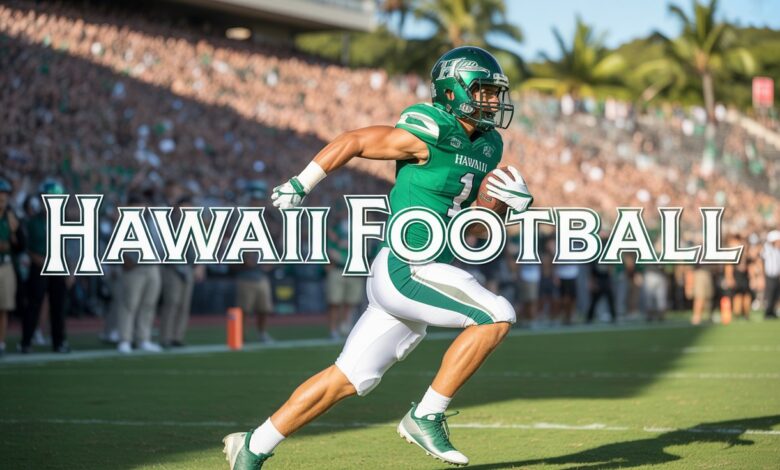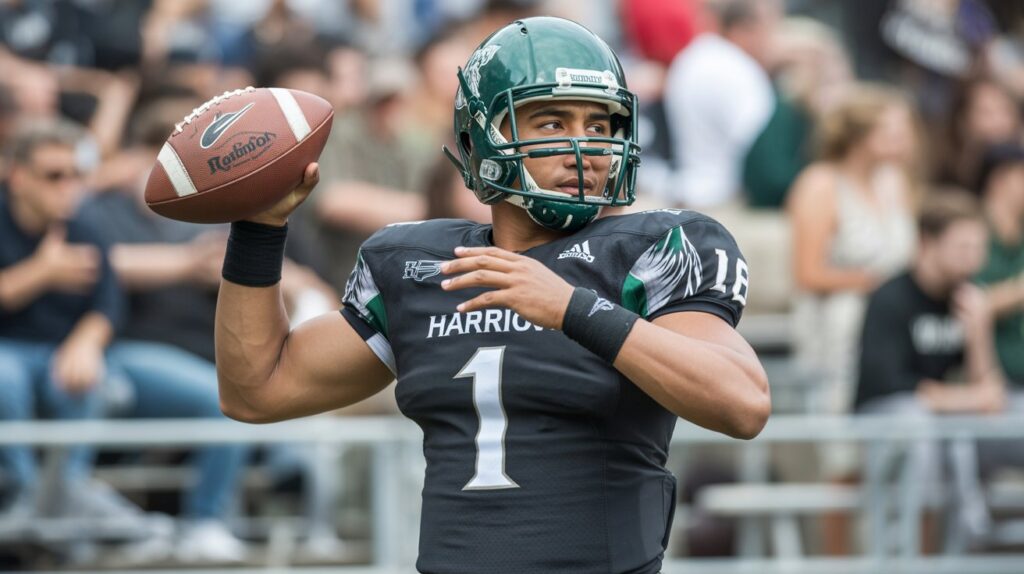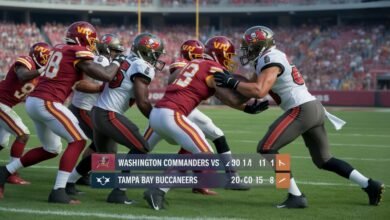Hawaii Football: The Complete Guide to Rainbow Warriors Football – History, Hype, and Hope

Introduction
When you think of Hawaii, your mind might go to beaches, palm trees, or surfing. But if you’re a football fan, there’s something else to know—the gripping, exciting, and often underrated world of Hawaii football. Whether you’re on the islands or watching from the mainland, the Rainbow Warriors bring a special heart to the game.
The University of Hawai’i football team, also known as the Rainbow Warriors, stands out for more than their location. From late-night matchups and tough travel schedules to passionate fans and rich cultural pride, Hawaii football is a true island experience in the world of college football.
This guide walks you through everything you need to know about Hawaii football—from its history and rivalries to key players, stadiums, and game-day magic. It’s packed with easy-to-read details and real stories, whether you’re a young fan, a parent, or a college football junkie looking to learn something new.
Let’s kick off and celebrate everything that makes Hawaii football one of a kind.
A Brief History of Hawaii Football
The Hawaii Rainbow Warriors football team plays for the University of Hawai’i at Mānoa. Their story began in 1909, and they’ve been proudly representing the islands ever since. Over the years, they’ve competed in various conferences but found a consistent home in the Mountain West Conference.
In 2007, Hawaii football made national headlines by going undefeated in the regular season, earning a spot in the Sugar Bowl against Georgia. Led by quarterback Colt Brennan, the team finished with a 12-1 record and proved Hawaii wasn’t just a vacation spot—it was a football powerhouse.
The nickname “Rainbow Warriors” mixes Hawaiian pride with tradition. While the name changed a few times over the years, it proudly returned to “Rainbow Warriors” in 2013—honoring a team and a culture full of strength and spirit.
What Conference Does Hawaii Football Play In?
Hawaii football is part of the Mountain West Conference (MWC), which they joined in 2012. The MWC includes several strong programs like Fresno State, Boise State, and San Diego State. These teams travel thousands of miles to play in Hawaii—and vice versa—which adds a unique factor to every matchup.
Being in the Mountain West has its highs and lows. The competition is tough, but it gives Hawaii regular chances to show what they’ve got against other respected teams. It also opens the door for postseason bowl game opportunities.
Travel is harder for Hawaii than for any other college football team. But the Rainbow Warriors lean into this challenge and wear it as a badge of honor. You play Hawaii on their turf? Be ready.
What Makes Hawaii Football So Unique?
There’s no team quite like Hawaii football, and here’s why:
- Location: Home games happen in Honolulu, often with dramatic island sunsets in the background.
- Time Zone: Hawaii games usually kick off late at night for mainland viewers—sometimes after 10 p.m. EST.
- Culture: The team embraces the spirit of ohana (family). It’s not just a game—it’s a community event.
- Traditions: Fans wear flower leis, the team does the haka (a ceremonial dance), and local bands keep the energy high.
- Travel Toll: Every away game is thousands of miles from home, which makes each win on the road feel stronger.
Everything about Hawaii football feels proud, powerful, and personal. No matter where they’re ranked, they play with unmatched heart.
Home Games at Clarence T.C. Ching Athletics Complex
Due to renovations at Aloha Stadium, home games are now played at the Clarence T.C. Ching Athletics Complex, located right on the UH campus in Mānoa. It’s smaller than the old stadium, but what it lacks in size, it makes up for in atmosphere.
- Capacity: Around 15,000 fans
- Location: Steps away from student life
- View: Mountains and palm trees behind the field
- Feel: Close, loud, and proud
The smaller stadium brings fans even closer to the action. It’s a tight-knit environment that screams unity and gives the players energy from every corner of the stands.
There are future plans to expand and upgrade the stadium. But for now, the Ching Complex is home—and the Rainbow Warriors are making it theirs.
The Hawaii Football Schedule: What to Expect Each Season
The Hawaii football schedule includes 12 regular-season games, usually starting in late August. Here’s what you can expect each year:
- Non-conference games: Teams from the Pac-12, SEC, or Big Ten often visit Hawaii—or host the Warriors.
- Mountain West matchups: Hard-hitting conference games beginning mid-season.
- Late-night start times: Games often kick off late for mainland viewers because of the time zone gap.
- Extended road trips: Sometimes three road games in a row due to travel planning.
Every season ends with hope for a bowl game or a shot at the Mountain West Championship Game.
Want to catch every play? Follow the university’s official team page or check updates on ESPN and the Mountain West website for the full schedule and times.
Rivalries and Key Matchups
Hawaii football has several games each year that fans never want to miss. Classic rivalries and red-hot matchups bring extra energy to the season.
Fresno State (Battle for the Golden Screwdriver)
Yes, that’s the real rivalry name! It began in the late 1990s and features close games and high emotion.
San Jose State
These teams often fight for a strong position in the Mountain West rankings. Tight scores, high-pressure moments, and bragging rights.
BYU
Though not in the same conference now, this was once a huge rivalry game that still excites fans whenever it’s on the schedule.
Boise State
Always a challenge, but a big win over the Broncos would be season-defining.
Rivalry games feel personal. If you’re only going to watch a few games, these are the ones to circle.
The Rainbow Warriors’ Team Identity

The Hawaii Rainbow Warriors are known for their strength, speed, and smart plays—especially on offense. Over the years, the team has become famous for exciting schemes like the Run-and-Shoot offense.
This pass-happy game style helped the team climb national rankings in the 2000s and continued to draw attention even when other teams overlooked them. With every season, new talent adds quick defense, hungry receivers, and mobile quarterbacks to the mix.
What sets Hawaii’s team identity apart?
- Aloha spirit: Players support one another and fight as a team.
- Never give up: Win or lose, they fight till the final whistle.
- Island pride: Players know they’re representing an entire state.
Their mission: Play hard. Play proud. Play for the islands.
Coaching and Leadership in Hawaii Football
Like all programs, coaching plays a big part in the growth of Hawaii football. New coaching hires often signal fresh energy and new hopes for the team’s direction.
The current coaching staff is focused on:
- Developing local talent from Hawaii and other Pacific islands
- Recruiting from California, the West Coast, and beyond
- Teaching player discipline, leadership, and life beyond football
Hawaii’s fans understand progress takes time. But support remains strong as long as the team gives their full effort. Every coach who joins Hawaii knows the expectations—not just for wins, but for community respect.
NFL Players Who Came from Hawaii Football
You might be surprised to know Hawaii has sent many players to the NFL. Here are some familiar names:
- Colt Brennan (QB) – A Hawaii legend and smiling star on the 2007 Sugar Bowl team.
- Davone Bess (WR) – Played for the Miami Dolphins.
- Trevor Davis (WR) – Drafted by the Green Bay Packers.
- Alex Green (RB) – Drafted in 2011 by the Packers.
- Greg Salas (WR) – Known for huge yardage totals in college.
These players showed that Hawaii doesn’t just play for fun. The Rainbow Warriors are a stepping stone to Sunday football.
Community and Fan Support: ‘Ohana Under the Lights
What makes Hawaii football even more touching is the unity between players and fans. Families bring kids. Students chant from the bleachers. Local aunties and uncles grill food and talk old games before kickoff.
The word ʻohana means “family” in Hawaiian—and that’s how the whole football experience feels. Whether you’re cheering in person or watching late-night games on the mainland, the community vibe shines through.
From tiny keiki football camps to major alumni weekends, the love for football on the islands keeps growing. The fans don’t just watch. They live it.
How to Watch Hawaii Football Games
Watching Hawaii football on TV or online can be tricky because of time zones—but it’s totally doable.
Here’s how:
- Mountain West Network: Streams select Hawaii games live and for free.
- Spectrum Sports Hawaii: Covers many of the local broadcasts.
- CBS Sports Network: Usually picks up national games vs. top MWC teams.
- ESPN or ESPN+: Available for big-named or non-conference matchups.
- Radio and online streams: Great for fans who miss live TV.
Just be ready for late-night kickoffs—especially if you live in the continental U.S. Games often begin at 10 PM or later for East Coast viewers.
Grab a snack, stay up late, and enjoy.
FAQs
1. What conference is Hawaii football in?
Hawaii is part of the Mountain West Conference, since 2012.
2. Where does Hawaii play home football games?
Home games are held at the Clarence T.C. Ching Athletics Complex on campus in Honolulu.
3. Has Hawaii ever played in a big bowl game?
Yes! Hawaii played in the Sugar Bowl in 2008, after an undefeated 2007 season.
4. What are Hawaii football fans called?
Fans are often called the Warrior Nation or part of the ʻohana (family).
5. When does the Hawaii football season usually start?
The season begins in late August or early September, and runs through November or December.
6. Can you watch Hawaii football on the mainland?
Yes, via CBS Sports Network, ESPN/ESPN+, Mountain West Network, and streaming platforms.
Conclusion
From sun-soaked stadiums and thunderous chants to hard-fought road wins and unforgettable bowl trips, Hawaii football is unlike anything else.
It’s not just about touchdowns and tackles. It’s about community, strength, and tradition—repping the Aloha spirit every Saturday. Whether you’re born on the islands or supporting from afar, being a Rainbow Warriors fan means joining a family full of heart.
So get geared up. Stay up late. Wave the green and white. And cheer loud, because Hawaii football is built on more than plays—it’s built on passion.





